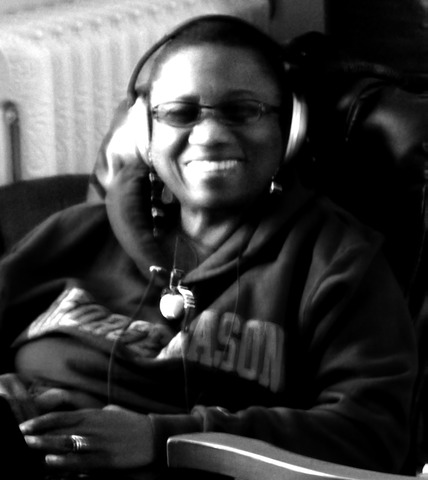In the common kitchen of an inn, Virginia

"My father wanted a boy, so he gave me a boy's name. My grandmother was a voodoo priestess. Mother converted to Jehovah Witness to escape it, married a Catholic, and I decided to be Anglican. I almost went into the convent after divorcing twelve years ago.
"Voodoo has always been a dark thing, full of violence and vengeance. I think it’s a big part of why Haiti has so many problems -- the people have no national vision, solidarity. Haiti was the first black nation, we went from slaves to leaders in an instant two hundred years ago, and that is too much to ask of a people. They don’t have the tools yet. They are in a worse position now, socially, culturally, politically, than other countries that have won their independence much more recently, because Haitians cannot see themselves as a people.
"If there is a problem, instead of talking about it, one person will perform a ritual to make the other see it their way, or stick pins in a little doll, or take poisonous herbs and sneak them into another's food so they get sick and know the warning given them. A friend went to visit and was surprised and glad to see the big vans in crazy painted colors proclaiming, 'God is Lord' and 'Jesus Saves!' I told him don't be impressed -- the people of my country are bipolar. In one instant they are Catholic, in the next they perform a sacrifice. It disturbs me. Voodoo is a large part of why I left Haiti.
"I worked for the World Bank for over 30 years. I'm retired now, but traveled to 25 African countries in my work in mediation and conflict resolution. But I always managed to avoid Benin, where it’s said that most of Haiti’s people come from. It's a center of Voodoo beliefs." I ask if she avoided it on purpose. “Oh yes,” she says. “I am not ready to face the past and reality of my people.
"In Liberia, I met a man who began crying when we were introduced, because his ancestors, his tribe, sold mine into slavery. I see instances in Haiti of people reverting to those same non-beliefs in the humanity of those who serve them now. There are still slaves in Haiti, and I hate that I contributed to their pain. Because I remember. Even my son had a servant. We had someone to cook, another to serve, another to clean up after. In Haiti, you don’t even think of those people as being people. When it rains, you just tell them to go out and get you something at the store, not worrying about them in the rain. If you ask for juice, and they bring water, you do not ask them to take it back and get the correct drink -- you say, okay, for that, you get no dinner tonight. Slavery is not a matter of skin color. We do it to our own.
"I'm here at the inn to finish my dissertation. It is on gender equality in Liberia, and how men react to the promotion of women in those efforts. I can't focus on Haiti, it's too close. I'd love to help my people, but I'm too discouraged. I fell in love with Liberia and its similarities to Haiti. Because I'm not from there, it's easier to work -- both in how I'm received, as a foreigner and expert, and in my own attitudes.
"I noticed that whenever anyone spoke of Haiti in lectures I’d attend, my body stiffened and mind became belligerent, asking defensive questions of the speaker- 'Where did you get this information? Who gave it to you? How was it verified? Was the person actually from Haiti? What was your methodology on this project?' But when dealing with Liberia, I understand that I'm not knowledgeable, I'm learning, and questions are good.
"I'd love to help Haiti, but it is nearly impossible. So I'll work to the side and help Liberians, and hope my work can be applied to Haiti and other struggling nations later on."